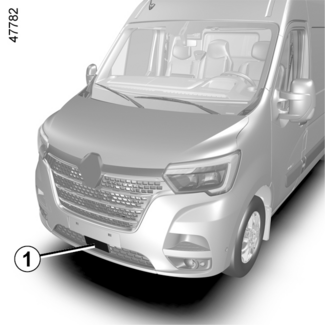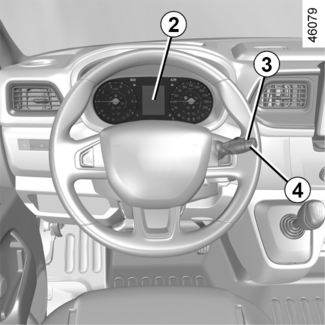Back to the list

Active emergency braking
Active emergency braking
WARNING
Active emergency braking
This function is an additional driving aid. This function is not under any circumstances
intended to replace the due care and attention of the driver, who should at all times
be in control of the vehicle. The triggering of this function may be delayed or prevented
when the system detects clear signs of control of the vehicle by the driver (action
on the steering wheel, pedals etc.).
The system cannot be activated:
- when the gearbox lever is in neutral or the clutch pedal has been depressed during approximately ten seconds;
- when the parking brake is activated;
- when the Electronic Stability Program (ESC) has been triggered;
- while cornering.
System servicing/repairs
- In the event of an impact, the sensor alignment may become changed, and its operation will consequently be affected. Deactivate the function, then consult an authorised dealer.
- Any work in the area where the radar is located (repairs, replacements, touching up of paintwork) must be carried out by a qualified professional.
Only an authorised dealer is qualified to service the system.
WARNING
System disturbance
Some conditions can disturb or damage the system's operation, such as:
- a complex environment (metal bridge, tunnel, etc.);
- poor weather conditions (snow, hail, black ice, etc.);
- ...
In these conditions, the system may not react or may brake inadvertently.
Limitation of the system operation
- Each time the vehicle is started, the system carries out a calibration according to the vehicle surroundings and may be inactive for a length of time between approximately two to five minutes.
- A vehicle travelling in the opposite direction will not trigger any alert or any action on the system operation.
- The sensor area should be kept clean and free of any modifications in order to ensure the proper operation of the system.
- The system cannot respond to small vehicles such as motorbikes or bicycles as effectively as to other vehicles.
In these conditions, the system may not react or may brake inadvertently.
Deactivating the function
You must deactivate the function if:
- the front of the vehicle has received an impact or has been damaged;
- the vehicle is being towed (breakdowns).
In the event of the system behaving abnormally, deactivate it and consult an authorised
dealer.
Halting the function
You can halt the active emergency braking function at any time by tapping the accelerator
pedal or by turning the steering wheel in an avoidance manoeuvre.
Location of the radar 1

Using information from the radar 1, the system calculates the distance which separates it from the vehicle in front.
The system informs the driver if there is a risk of head-on collision to enable appropriate
emergency manoeuvres (pressing the brake pedal and/or turning the steering wheel).
Depending on the reactivity of the driver, the system can assist with braking in order
to limit damage or prevent a collision.
Ensure that the radar area is not obstructed (by dirt, mud, snow, a badly fitted front
number plate), impacted, modified (including painting) or hidden by any accessory
fitted on the front of the vehicle (on the grille or logo etc.).
WARNING
This function is an additional driving aid. This function is not under any circumstances
intended to replace the due care and attention of the driver, who should at all times
be in control of the vehicle.
Operation
Detection of vehicles
When driving at a speed between approximately 3 mph (5 km/h) and 87 mph (140 km/h),
if there is a risk of collision with the vehicle in front, the system:
- warns you of a collision risk:
warning light  flashes on the instrument panel, accompanied by a beep.
flashes on the instrument panel, accompanied by a beep.
If the driver presses the brake pedal and the system still detects a risk of collision,
the  warning light continues to flash on the instrument panel, accompanied by an beep,
until the system no longer detects the risk of collision.
warning light continues to flash on the instrument panel, accompanied by an beep,
until the system no longer detects the risk of collision.
- The following situations may trigger braking:
if the driver fails to react following the alert and collision becomes imminent.
If the vehicle stopped as a result of active emergency braking, the driver must keep
the vehicle stationary by applying the brake pedal.
Note: if the driver uses the vehicle controls (steering wheel, pedals, etc.) the system
may delay certain operations or not activate.
Tip
Depending on the vehicle speed, the system only detects vehicles driving in the same
direction of traffic or at a standstill. The system may not detect motorcycles because
of the difficulty in forecasting their trajectory.
Special features of stationary vehicles
Stationary vehicles are detected when your vehicle is being driven at a speed between
approximately 3 mph (5 km/h) and 68 mph (110 km/h). The system is not active and does
not emit a warning for stationary vehicles when your vehicle speed exceeds approximately
68 mph (110 km/h).
Tip
In the event of an emergency manoeuvre, you can stop the braking at any moment by:
- tapping the accelerator pedal;
or
- turning the steering wheel as a collision avoidance manoeuvre.
Activating/deactivating the system

With the vehicle stationary and the ignition on:
- repeatedly press button 3 or 4 to select the "Active braking" function on the display 2;
- press and hold button 3 or 4 (for around three seconds) to deactivate the system.
The  warning light appears continuously on the instrument panel to confirm that the system
has been deactivated.
warning light appears continuously on the instrument panel to confirm that the system
has been deactivated.
The  warning light appears continuously on the instrument panel to confirm that the system
has been deactivated.
warning light appears continuously on the instrument panel to confirm that the system
has been deactivated.
Press and hold button 3 or 4 to reactivate the system. The warning light  disappears from the instrument panel.
disappears from the instrument panel.
Tip
This system is reactivated each time the ignition is switched on.
Temporarily not available
When the system detects a temporary unavailability, the  warning light appears continuously on the instrument panel accompanied by the message
"Front radar no visibility
».
warning light appears continuously on the instrument panel accompanied by the message
"Front radar no visibility
».
There are two possibilities:
- the system is temporarily disrupted (for example: radar obscured by dirt, mud, snow, etc.). In this case, park the vehicle and switch off the engine. Clean the detection zone of the radar. When you next start the engine, the warning light and the message should disappear;
- if this is not the case, this may arise from another cause; contact an Approved Dealer.
Operating faults
Warning lights  and
and  appear on the instrument panel accompanied by the "Check active braking" message to indicate a system fault. Consult an approved dealer.
appear on the instrument panel accompanied by the "Check active braking" message to indicate a system fault. Consult an approved dealer.